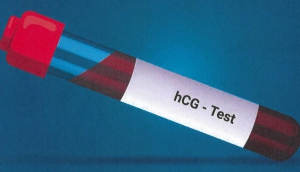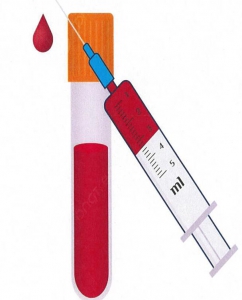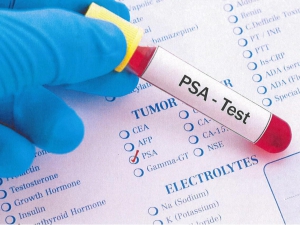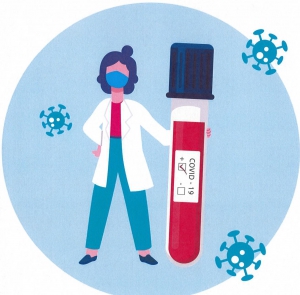LIST OF BLOOD TEST AND WHAT THEY ARE AND WHAT THEY CHECK FOR
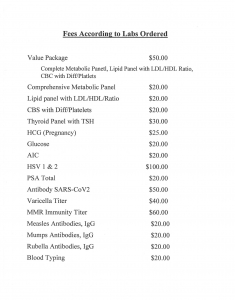 Here at the Marshall County Health Department, you can come in and have lab draws done without a drs order. We are NOT responsible for forwarding the result to your provider. We are NOT responsible for the treatment of abnormal lab work. You MUST follow up with your PCP (Primary Care Phycian). And you MUST call our office and speak with a nurse to schedule an appointment for Lab Draws. We do not do them on a walk in basis. We do not bill insurance for these Lab Draws, so there will be a cost associated with the test. I am also attaching a copy of the price list to this . Our number is 304-845-7840.
Here at the Marshall County Health Department, you can come in and have lab draws done without a drs order. We are NOT responsible for forwarding the result to your provider. We are NOT responsible for the treatment of abnormal lab work. You MUST follow up with your PCP (Primary Care Phycian). And you MUST call our office and speak with a nurse to schedule an appointment for Lab Draws. We do not do them on a walk in basis. We do not bill insurance for these Lab Draws, so there will be a cost associated with the test. I am also attaching a copy of the price list to this . Our number is 304-845-7840.
CMP COMPREHENSIVE METABOLIC PANEL
A Comprehensive Metabolic Panel (CMP) is a blood test that measures various substances in your blood to assess your overall health, particularly the functioning of your liver and kidneys.
A CMP is a routine blood test that provides valuable information about your body's metabolism and the health of key organs. It typically includes 14 different tests that measure substances such as glucose, electrolytes, proteins, and waste products. This test helps healthcare providers diagnose, screen for, and monitor various health conditions, including diabetes, kidney disease, and liver disorders.
Components of a CMP
- Glucose: Indicates blood sugar levels; high levels may suggest diabetes.
- Calcium: Essential for bone health and muscle function.
- Sodium: Regulates fluid balance and is crucial for nerve and muscle function.
- Potassium: Importan for heart and muscle function.
- Chloride: Helps maintain proper fluid balance.
- Carbon Dioxide (CO): Provides insight into your body's acid-base balance
- Blood Urea Nitrogen (BUN): Reflects kidney function and hydration status.
- Creatinine: Assesses kidney funtion; elevated levels may indicate kidney issues.
- Albumin: A protein made by the liver; low levels may indicate liver or kidney disease.
- Total Protein: Measures the total amount of proteins in your blood.
- Alkaline Phosphatase (ALP): An enzyme related to liver and bone health.
- Alanine Aminotransferase (ALT): An enzyme that helps assess liver function.
- Aspartate Aminotransferase (AST): Anothe enzyme that indicates liver health.
- Bilirubin: A waste product from the breakdown of red blood cells; high levels may indicate liver problems.
Healthcare providers often order a CMP as part of routine check-ups or to monitor existing health conditions.
The Comprehensive Metabolic Panel is a crucial tool in preventive healthcare, providing insights into your body's chemical balance and organ function. Regular testing can help catch potential health issues early and monitor the effectiveness of treatments or medications.
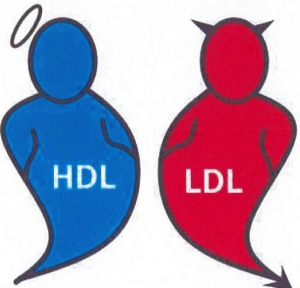 Lipid Panel with LDL/HDL Ratio
Lipid Panel with LDL/HDL Ratio
A Lipid Panel with LDL/HDL Ratio measures various cholesterol levels in your blook, including LDL (low density lipoprotein) and HDL (high-density lipoprotein). It includes measurements of the following:
- Total Cholesterol: The overall amount of cholesterol in your blood
- LDL (low-density Lipoprotein): Often referred to as "bad" cholesterol, high levels can lead to plaque buildup in arteries, increasing heart disease risk.
- HDL (high-density Lipoprotein): Known as "good " cholesterol, it helps remove LDL cholesterol from the bloodstream. Higher levels are generally better for heart health.
- Triglycerides: A type of fat found in the blood, which can also affect heart health.
The LDL/HDL ration is particulary important as it provides insight into the balance between "bad" and "good" cholesterol, helping to evaluate the risk of cardiovascular diseases.
To prepare for the Test: It is recommended to fast 12 to 14 hours before the test for accurate results. Only water is allowed during this period
Diet: ideally , patients should maintain a stable diet to two to three weeks prior to testing to ensure consistent lipid levels.
This test is crucial for evaluating heart health and determining the risk of cardiovascular diseases.
A CBC with differential and platelets is a comprehensive blood test that measure various components of your blood, including red blood cells, white blood cells, and platelets, providing insights into your overall health and immune system function. When this test is performed with a differential and platelet count, it provides detailed information about the different types of blood cells present.
Red Blood Cells (RBCs): Carry oxygen throughtout the body.
White Blood Cells (WBCs): Part of the immune system, helping to fight infections. The differential counts the different types of WBCs, including neutophils, lymphocytes, monocytes, eosinophils, and basophils
.Platelets: Help with blood clotting.
This test can be done as part of a regular checkup to assess overall health.
Diagnosing Conditions: it helps identify conditions such as anemia, infections and blood disorders.
Monitoring Health: It is useful for tracking the effects of treatments for chronic conditions, such as cancer or autoimmune diseases.
The test measures the following:
- Total Red Blood Cells (RBC) Indicates the number of red blood cells in the blood
- Hemoglobin (Hb) Measures the amout of hemoglobin, the protein that carries oxygen in red blood cells.
- Hematocrit (Hct) The percentage of blood volume that is made up of red blood cells.
- Total White Blood Cells (WBCs) Indicates the overall number of white blood cells.
- Differential White Blood Cell Count Breaks down the total WBC count into the different types of white blood cells.
- Total Platelets Measures the number of platelets in the blood, which are crucia for clotting.
High WBC may indicate an infection or inflammation
Low RBC could suggest anemia or other blood disorders
Abnormal Platelet count Can indicate issues with blood clotting or bone marrow function.
This test is a vital tool in medical diagnostics, providing essential information about your blood health and helping guide treatment decisions.
A thyroid panel with TSH is a blood test that assesses thyroid function. It includes measurements of thyroid-stimulating hormone (TSH) total thyroxine (T4) triiodothyronine (T3) uptake, and free T4 indes. This panel is useful for evaluating thyroid function, particularly with pituitary disease is not suspected. Additionally, a full thyroid panel typically includes TSH, which regulates the production of thyroid hormones.
TSH is produced by the putuitary gland and plays a crucial role in regulating the thyroid gland's hormone production, which affects metabolism and various bodily functions High TSH levels typicall indicate an underactive thyroid (hypothyroidism), while low TSH levels suggest an overactive thyroid (hyperthyroidism).. The TSH test measures the levels of this hormone in the blood to help diagnose thyroid conditions.
T4 also know as thyroxin, is a hormone produced by the thyroid gland. It plays a crucial role in regulating metabolism, digestion, muscle function, and bone health. T4 is the main hormone released into the bloodstream by the thyroid and works alongside another hormone called T3 to maintain various bodily functions.
T3 or triiodothyronine, is an active thyroid hormone that plays a crucial role in regulating metabolic processes within the body. It is primarily produced by the thyroid gland, with most T3 being generated from the conversion of T4 in peripheral tissues like the liver and the kidneys. A T3 test is often conducted to diagnose conditions such as hyperthyroidism, as abnormal levels can indicate thyroid dysfunction. Normal T3 levels suggest aadequate thyroid function, while high levels may indicate hyperthyroidism, and low levels signal hypothyroidism.
Human chorionic gonadotropin (hCG) is a hormone produced by the placenta shortly after a fertilized egg attaches to the uterine lining. It plays a crucial role in maintaining pregnancy by signaling the body to produce other hormones, such a progesterone, which are essential for fetal development
The hCG test is primarily used for:Confirming Pregnancy: It can detect pregnancy as early as 11 days after conception, with levels typically doubling every 48 to 72 hours in early pregnancy.
Monitoring Pregnancy: Healthcare providers may order multiple tests to track hCG levels, ensuring they rise appropriately during the first trimester.
Detecting Abnormalities: Abnormal hCG levels can indicate potential issues, such as ectopic pregnancy, miscarriage, or certain health conditions, including some cancers.
The glucose blood test is essential for assessing how well your body manages glucose, which is a primary source of energy for your cells. Abnormal glucose levels can indicate conditions such a prediabetes or diabetes, where the bpdy either does not produce enough insulin or cannot effectively use the insulin it produces.
Fasting Blood Glucose Test: This test measures blood sugar after fasting for at least 8 hours. It provides a baseline level of glucose in the blood and is commonly used to screen for diabetes.
Random Blood Glucose Test: This test can be done at any time, regardless of when you last ate. It is often used if you have symptoms of diabetes.
Oral Glucose Tolerance Test: This test involves fasting overnight, followed by drinking a sugary solution. Blood samples are taken at intervals to see how your body processes glucose.
Hemoglobin A1C Test: This test measures your average blood glucose levels over the past 2 to 3 months and does not require fasting.
The A1C test also known as the hemoglobin A1C glycated hemoglobin, or HbA1c test, is a blood test that provides an average of your blood sugar levels over the last two to three months. It measures the percentage of hemoglobin in your red blood cells that is coated with sugar (glucose). The higher the A1C percentage, the higher your average blood sugar levels have been.
The purpose of the A1C testDiagnosing Diabetes: The A1C test is commonly used to diagnose prediabetes and Type 2 diabetes. A result of 5.7% to 6.4% indicates prediabetes, while a result of 6.5% or higher suggests diabetes.
Monitoring Diabetes Management: For individuals already diagnosed with diabetes, the A1C test helps assess how well their treatment plan is working. It can indicate whether blood sugar levels are being effectively managed.
How is the A1C Test Conducted:Blood Draw: A healthcare provider takes a blood sample from a vein, which is then sent to a laboratory for analysis. This method is the most common and provides accurate results.
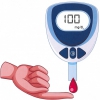 Finger Prick: A small blood sample is taken from a finger prick, with results in minutes. This method is typically used for monitoring rather than diagnosing.
Finger Prick: A small blood sample is taken from a finger prick, with results in minutes. This method is typically used for monitoring rather than diagnosing.
Ranges for A1C
Normal Range: An A1C level below 5.7% is considered normal
Prediabetes: A level between 5.7% and 6.4% indicates prediabetes, which increases the risk of developing Type 2 diabetes.
Diabetes: An A1C level of 6.5% or higher confirms a diabetes diagnosis.
The HSV 1 and 2 blood tests are used to detect antibodies for the herpes simplex viruses, helping diagnose infections caused by HSV 1 and 2
- HSV 1: Primarily associated with oral herpes, which can cause cold sores around the mouth. It can also lead to genital herpes through oral sex.
- HSV 2: Mainly responsible for genital herpes, a sexually transmitted infection (STI). It can also cause oral herpes in some cases.
The HSV blood tests, specifically the herpes IgG testm are designed to detect antibodies produced by the immune system in response to the herpes virus. These tests are particularly useful for:
- Diagnosisng herpes infections in individuals who may not have visible symptoms.
- Confirming exposure to HSV 1 or HSV 2, especially if a person has had sexual contact with someone who has herpes.
- Differentiating between HSV1 and HSV 2 infections, which can influence treatment and management strategies.
Positive Result: Indicate that the individual has been exposed to the virus. It does not necessarily mean that they will experience symptoms, as many people remain asymptomatic.
Negative Result: Suggests that the individual has not been infected, but if tested too early, it may not accurately reflect the infection status.
Testing for HSV is crucial for managing sexual health, especially for individuals with multiple partners or those who suspect exposure. It helps in understanding the risk of transmission and informs treatment options if necessary. There is no cure for herpes, but antiviral medications can help manage outbreaks and reduce the risk of transmission to partners. In summary, the HSV 1 and 2 blood tests are essential tools in diagnosing and managing herpes infections, providing valuable information about an individuals health status regarding these common viruses.
The PSA (Prostate-Specific Antigen) test is a blood test that measures the amount of PSA, a protein produced by both normal and cancerous to prostate cells, in your blood. While it is normal to have some PSA in your blood, elevated levels may indicate prostate issues, including benign conditions or prostate cancer.
Who Should Get Tested?
Age Considerations: Men aged 50 and older are generally encouraged to discuss the PSA test with their healthcare provider. Those with a family history of prostate cancer or who are Black may be advised to start testing earlier, around age 45.
Symptoms: If you experience symptoms such as difficulty urinating, blood in urine, or pelvic pain, your doctor may recommend a PSA test.
The PSA test is typically performed at a healthcare facility, where a healthcare professional will draw a blood sample. It is important to avoid certain activities before the test, such as vigorous exercise or ejaculation, as these can temporarily raise PSA levels.
Normal Levels: PSA levels can vary by age, but generally, levels below 4.0 ng/mL are considered normal. Levels between 4.0 and 10.0 ng/mL may indicate a higher risk of prostate cancer, while levels above 10.0 ng/mL are concerning and warrant further investigation.
Factors Affecting PSA Levels: Various factors can influence PSA levels, including benign prostatic hyperplasia (BPH), prostatitis, urinary tract infections, and recent physical activities.
While the PSA test can be a useful tool for early detection of prostate cancer, it is not perfect. Elevated PSA levels do not always indicate cancer, and some cancers detected may not require immediate treatment. Discussing the benefits and risks of the test with your healthcare provider is essential before proceeding .
The PSA test is a valuable tool for assessing prostate health, but it is important to understand its limitations and to have a thorough discussion with your healthcare provider regarding its implications.
An antibody test for SARS-CoV2 is a blood test that checks for antibodies your body has produced in response to the virus or vaccination.It indicates whether you had a past infection or were vaccinate against COVID 19.
The test cannot determine if you are currently infected with the virus.Antibodies may remain detectable in your blood for several months, providing some level of immunity.
It is recommended to wait 2-3 weeks after infection or vaccination before taking the test for the most accurate results.
 Varicella Titer, Hepatitis B Titer and MMR Immunity Titer
Varicella Titer, Hepatitis B Titer and MMR Immunity Titer
The varicella, hepatitis B and MMR titer tests assess your immunity levels to these diseases.
Hepatitis B and MMR (Measles, Mumps, Rubella) tests checke for IgG antibody titers, indicating your immune status.
Varicella (Chickenpox) tests measure the presence of antibodies against the varicella-zoster virus
These tests are typically performed through a blood sample, which can be collected at a MinuteClinic or other healthcare facilities.
A 5-in-1 panel may also include tests for these diseases, providing a comprehensive assessment of your immunity status.
 Measles Antibodies IgG, Mumps Antibodies IgG, and Rubella Antibodies, IgG
Measles Antibodies IgG, Mumps Antibodies IgG, and Rubella Antibodies, IgG
The Measles, Mumps, Rubella (MMR) IgG blood test is a diagnostic test used to determine immunity to the measles, mumps and rubella viruses. It checks for the presence of IgG antibodies in the blood, which are produced by the immune system in response to past infections or vaccination. A positive result indicates that the individual has been exposed to the viruses or has been vaccinated, providing adequate laboratory evidence of immunity. The test is particularly important for individuals planning to become pregnant, as rubella during the first trimester can lead to birth defects. It is also used by healthcare workers and college students to prove immunity to these diseases. The test is not recommended for those who have had two documented doses of the measles-containing vaccine and still test negative or have equivocal results, as they are considered to have presumptive evidence of immunity.




